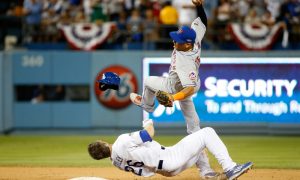Kershaw, Scherzer, Verlander, Price, Shields, Lester, Bumgarner, Strasburg. These are some of the biggest names in baseball. But something separates these guys from a Cabrera or a Trout. Sure, they’re pitchers, but they’re more than that. They’re aces. When October rolls along, aces take on an entirely new role. They go from pitching once every five games to three-day rests. During the playoffs, managers depend upon these pitchers in a completely different way than their other players. With a trip to the World Series on the line, aces are pushed to their physical limits. When your ace is on the mound, you’ve got the best chance of winning, leading managers to keep their aces in for as long as possible. But in light of recent events, we have to question the tremendous burdens that fall on just a few individuals. Are teams too dependent upon their aces?
Let’s take a look at the AL Wild Card Game. Jon Lester, a longtime member of the Red Sox, took the mound for the struggling A’s. Due to Oakland’s inconsistent bullpen, they needed Lester to pitch deep into the game. After seven innings of decent pitching, a tired Lester was forced to return to the mound in the eighth, and the Royals took advantage. Shields, of the Royals, was able to hand the ball to a capable Royals bullpen in the sixth. If Lester didn’t have to do it all on his own, there may have been a different outcome.
Sticking with the American League, I now turn to the ALDS between the Orioles and the Tigers. After a blockbuster trade brought David Price to Detroit, the Tigers had the prettiest sounding rotation in the league. Scherzer, Verlander, and Price, three Cy Young winning pitchers, provided plenty of ace-caliber starting pitching. Due to a mediocre Detroit bullpen, it was imperative that these star pitchers last late into each game. Scherzer and Verlander couldn’t stay in late enough, and the Tigers bullpen gave up a total of twelve runs in the eighth innings of Games 1 and 2. Price pitched well in Game 3 over eight innings, preventing any disastrous bullpen implosions, but the Detroit offense simply could not produce, and the Orioles advanced in three games.
Now to the National League. In the Wild Card Game, the Giants started Madison Bumgarner, owner of an 18-10 record and 2.98 ERA, and they were generously rewarded. Bumgarner pitched a beauty-4 hits and 10 K’s over a complete game shutout. Pittsburgh, on the other hand, was not so fortunate. The Pirates elected to start the hard-throwing, rising star Gerrit Cole in the last game of the regular season in an attempt to avoid the Wild Card Game altogether. They were unsuccessful. Come the Wild Card Game, the Pirates were left with the inconsistent Edinson Volquez, who had a Major League worst 5.71 ERA in 2013. Volquez gave up five runs in only five innings before watching the bullpen give up another three over the last few innings.
The Giants went on to beat the Nationals in four games in the NLDS. In Game 1, Washington started Stephen Strasburg, who, with a 14-11 record, has not yet proven himself worthy of the title of “ace.” In just over five innings, Strasburg allowed two runs and eight hits, with only two strikeouts. Reliever Craig Stammen let up another run in the seventh, after a triple from Joe Panik and a base hit from Buster Posey. The Nats avoided a sweep with a Game 3 victory thanks to a great performance from Doug Fister. Fister threw for seven innings without allowing a run, and the Washington bullpen only gave up one. The game opened up for the Nationals with a peculiar decision from none other than Giants ace Madison Bumgarner, who returned to the mound off four days’ rest. Bumgarner scooped up a bunt in the seventh and threw past the reach of third-baseman Pablo Sandoval, resulting in two runs. San Francisco has not been a high-scoring team, winning Games 1 and 2 with three and two runs, respectively. They needed another stellar performance from Bumgarner, and with the backbreaking error, they didn’t quite get it.
The Dodgers had the benefit of the most dominant ace in the league, Clayton Kershaw. Kershaw will most likely earn both NL Cy Young and MVP honors for his spectacular 2014 campaign, which saw him post a 21-3 record and a 1.77 ERA. And that’s with over a month on the DL. L.A. was justifiably confident with starting Kershaw in Game 1, but in an anomalous performance, the best pitcher in baseball let up eight runs late in the game. Nevertheless, Clayton Kershaw is still Clayton Kershaw, and the Dodgers gave him the start yet again in Game 3 after only three days’ rest. After six lights-out innings, a tired Kershaw may have paid for his lack of rest, letting up a three-run homer to Matt Adams, and that was all the Cardinals needed. Was Kershaw’s nightmarish seventh inning a direct result of his rushed start? Who knows? Everyone is entitled to one bad start, but nobody expected two in a row from the best pitcher in the league. It’s hard to imagine that a well-rested Kershaw would have let that happen.
October is grueling for aces. They often have to go late into the game to make up for unimpressive bullpens and lackluster hitting, and then come back after only three or four days’ rest. This may be too much to ask of even the most talented pitchers in the league. Teams must refrain from relying entirely on one player. There is no excuse for a lack of offense and an incapable bullpen. Instead of putting the weight entirely on one arm, teams need to ensure that they can bring in a reliever without hesitation. Too much may be expected in the playoffs, but maybe that makes it all the more special when they pull it off.





